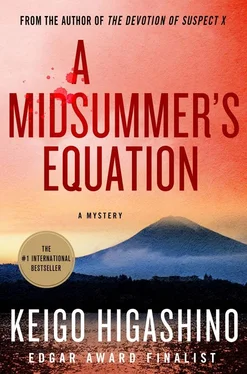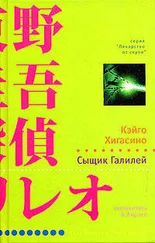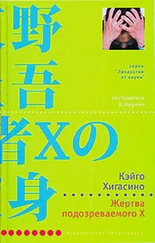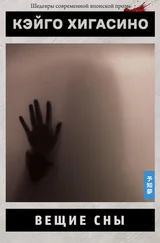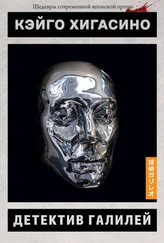“We’re still unclear what the connection between Mr. Tsukahara and Hari Cove might be,” Motoyama concluded. “Nor are we entirely sure of the reason behind his interest in the undersea mining talks.”
Isobe groaned and his eyes opened wider as he scanned the faces of the three detectives. “So, how sure are they about this?”
“Sorry?” Motoyama asked. “How sure is who about what?”
“The widow and this director from Tokyo. How sure are they that it was murder?”
“Well...” Motoyama began, shooting a look at Okamoto, whose eyes were fixed firmly on the floor. “We didn’t find anything particularly suspicious in our examination of the scene,” Motoyama continued. “There were no signs of a struggle, nor any other visible evidence of injury.”
“But this director noticed something you didn’t, right? That’s why he ordered the autopsy?”
Okamoto looked up. “We’re not entirely sure that’s what happened—”
“Then what happened?”
“Well, the deceased, Mr. Tsukahara, was the director’s superior officer in Tokyo. So, I think he just wanted to double check everything, you know.”
“Which is why we’re here,” Isobe growled. “Just to get this straight, you didn’t order an autopsy yourselves because you didn’t think you’d find anything, correct? You think it was just an accident.”
Okamoto and Motoyama sat silently.
Isobe shook his head and muttered under his breath, “Great.”
“That Isobe guy’s got a bad reputation,” Hashigami said, leaning on the window as he looked outside at the passing scenery.
“How so?” Nishiguchi asked, fiddling with the tab on the can of a vending machine coffee.
The two detectives had boarded at Central Hari Station. The train car was empty, so they were sitting across from each other in a booth seat meant for four.
“Let’s see, he’s ambitious, a bit of a manipulator, and a brownnoser to boot. The whiff of homicide in this case has got him all excited. Great chance for a promotion.”
“That was him excited? He looked pretty grumpy to me.”
Hashigami waved a finger. “He was just putting that on. I bet you ten to one he’s back at the prefectural office right now, delivering his report so energetically the spit’s flying out of his mouth.”
If Isobe wanted this to be murder, that explained why he’d been so irritated with Okamoto and Motoyama’s insistence that it was an accident.
The train made its way along the coastal line, arriving at Hari Coast Station. Neither of the detectives moved to get up. They would be going one stop further, to East Hari.
The day Tsukahara attended the DESMEC hearing, he’d taken a taxi to the community center. They’d since tracked down the taxi driver, and he said he’d gotten a call from the dispatcher for pickup at East Hari Station, despite the fact that Hari Cove Station was much closer, a fact that had been written on the attendance voucher in Tsukahara’s possession. So Nishiguchi and Hashigami were on their way to do some questioning and find out exactly why he’d been way out in East Hari the morning of his death.
East Hari Station had been built a ways inland, with a straight road leading from the front of the station toward the coast. A few side streets led off to local points of interest: a rose garden, a music box museum, a museum of curios and trompe l’oeil paintings — all attractions planned in previous decades to make up for the town’s distance from the seashore. Few had been successful. Most of the small shops along the main road had their shutters closed, making it hard to tell which were open.
“Compared to this place, Central Hari’s a metropolis,” Hashigami commented as they walked. “At least there you see people on the street. This is a ghost town.”
Still, they were successful in finding a few shops that were open for business. They split up to ask questions, each carrying a photograph of Tsukahara. Nishiguchi was the first to catch a break: an old woman who worked at a shop with rows of dried seafood on display recognized Tsukahara’s face. She said he’d stopped by the day before.
“He wanted to know the way to Marine Hills,” she told him.
“Marine Hills?”
A smile formed in the wrinkles of the woman’s face. “The summer resort place. They built it some time ago. Don’t think many people are up there now.”
Nishiguchi got directions and gave Hashigami a call. They took a side street and began heading up a long, gentle slope.
“Come to think of it, I’ve heard of this place,” Hashigami said. “Some big real estate place threw down a bunch of homes. Only ended up selling a few of them. It was a big loss.”
“Do you think Tsukahara had an interest in failed real estate deals?” Nishiguchi wondered out loud.
“Everyone’s got to have a hobby.”
Eventually, the first of the homes came into view. No doubt they seemed like the peak of luxury at the time they’d been built. Now they looked painfully run down and dilapidated.
A man in his fifties wearing a straw hat was clipping grass by the side of the road. Hashigami called out to him, and he introduced himself as an employee of the real estate company.
“All the homes are for sale as far as I know, not that anyone’s buying. Guess they figure they at least need to keep the grass cut, just in case.”
Hashigami showed him the photo of Tsukahara.
“Oh yeah, I seen that guy just the other day,” the man said immediately. “He was checking out Senba’s house. That’s why I noticed him.”
“Senba’s house?”
The man pointed off into the distance. “See that white one there, up on the slope? That’s Senba’s old house.” He turned back to face the detectives, and added, “You know — Senba, the murderer.”
“Hey, Kusanagi, I found it.”
Kusanagi leaned back and swiveled around in his chair. Kaoru Utsumi was approaching, a folder in her hand.
“Oh, thanks. What was the case?”
“Wouldn’t it be quicker to read it yourself?”
“I’ll look over the details later. Give me the short version.”
Utsumi leaned on a nearby desk, staring down at Kusanagi. “You’re feisty today,” she said.
“Of course I’m feisty. This is on orders from the director.”
“I understand, except for the part where I’m your assistant all of a sudden.”
“They said I was allowed to deputize whomever I needed.”
“So why me?”
Kusanagi grinned and looked up at her. “I told you Yukawa was there, didn’t I?”
“Which is why they’ve picked you. Still missing the connection to me.”
“It’s pretty obvious. He’s not going to drop everything to help us with the investigation, so your job is to win him over.”
Utsumi scowled. “I’m not sure I’m qualified.”
“You’ll be fine. He won’t listen to me, but if you come crying to him, he’ll fold. I guarantee it.”
“I have to put on a show, now?”
“I’m sure you’ll do whatever the situation demands. Now, please, the case? We don’t have a lot of time.”
Utsumi sighed and glanced down at the folder in her hand. “Name: Hidetoshi Senba. Arraigned on charges of murder sixteen years ago, and sentenced to eight years in prison. The murder took place on a street on the west side of Tokyo.”
“On the street? Was it a fight?”
Utsumi shook her head. “The victim’s name was Nobuko Miyake, forty years old at the time. She’d worked for years as a nightclub hostess but was unemployed at the time of her death. Senba was an old acquaintance, and they went drinking the night before he killed her. Apparently, he asked her to return some money he’d loaned her, and she played dumb, saying she didn’t remember any loan. The next day, he went to meet her and threatened her with a knife, saying he’d kill her if she didn’t return the money. Instead of getting scared, she laughed at him; he lost his temper and stabbed her. That’s the digest version.”
Читать дальше
